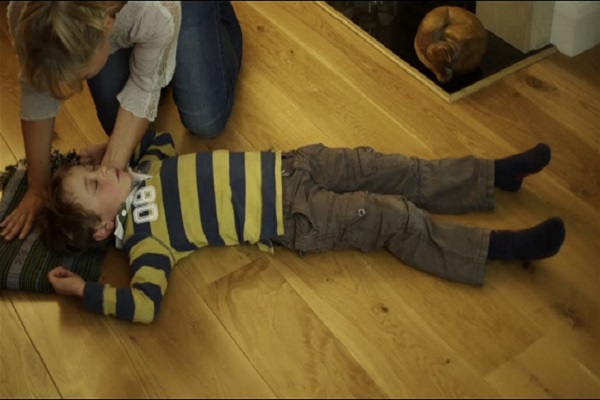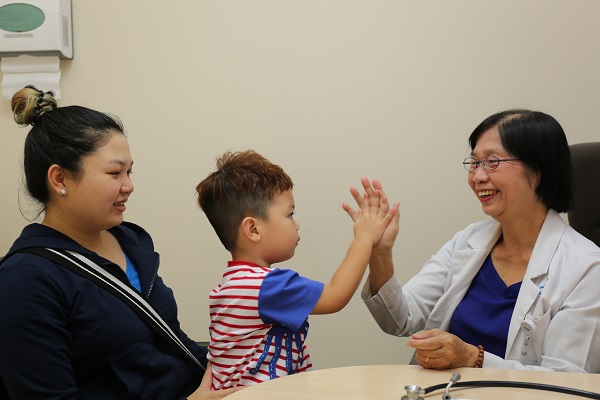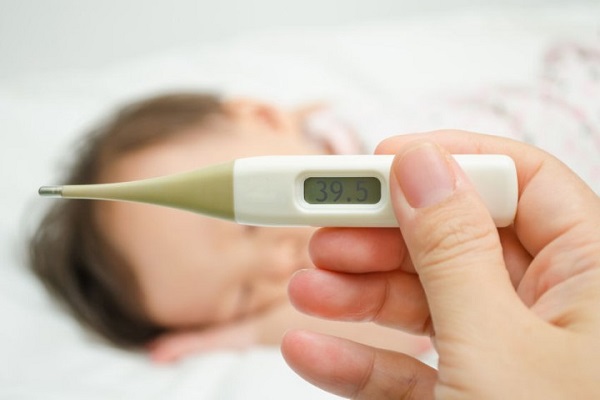Febrile seizures (also called febrile convulsions) occur in young children in conjunction with fever. Sometimes the seizure comes "out of the blue" before it is recognized that the child is ill. A fever may begin silently in a previously healthy child. A seizure can be the first sign that alerts the family that the child is ill.
What Are Febrile Seizures?
Febrile seizures are convulsions that can happen when a young child has a fever above 100.4°F (38°C). (Febrile means "feverish.") The seizures usually last for a few minutes and stop on their own. The fever may continue for some time.
Febrile seizures can look serious, but most stop without treatment and don't cause other health problems. Some kids might feel sleepy after one, while others feel no lasting effects.
What Are the Signs & Symptoms of Febrile Seizures?
The symptoms include:
There are two types of febrile seizures. The symptoms include:
- Simple febrile seizures are most common. They're usually over in a few minutes, but in rare cases can last up to 15 minutes. During this type of seizure, a child may:
- convulse, shake, and twitch all over
- roll the eyes
- moan
- become unconscious (pass out)
- vomit or urinate (pee) during the convulsions
- Complex febrile seizures last longer than 10 minutes, happen more than once in 24 hours, and involve movement or twitching of only one part or one side of the body. Prevention and treatment of children with high fever, convulsions
Who Gets Febrile Seizures?
Febrile (FEH-bryle) seizures happen in kids 6 months to 5 years old. They're most common in toddlers 12–18 months old.
Kids are more likely to have a febrile seizure if:
- They have a family history of febrile seizures.
- They've already had one. About 1 in every 3 kids who have had one febrile seizure will have another, usually within 1–2 years of the first.
- They had a first febrile seizure when they were younger than 15 months old.
- Most children outgrow having febrile seizures by the time they are 5 years old.
- Febrile seizures are not considered epilepsy (seizure disorder). Kids who have a febrile seizure have only a slightly increased risk for developing epilepsy.

When to see a doctor
If your child’s febrile seizure lasts less than five minutes, make an appointment to see your GP as soon as possible to find out the cause of the fever that caused the seizure.
If the seizure was less than five minutes long and your child was very unwell before the seizure, take them to see your GP or visit to your nearest hospital emergency department immediately. It may be OK to take the child in your own car, but only do this if there are two adults – one to drive and one to look after the child. Drive very carefully. A few minutes longer will not make any important difference.
Call an ambulance immediately if:
- it is your child's first seizure
- the seizure lasts more than five minutes
- your child does not wake up when the seizure stops
- your child looks very sick when the seizure stops.
Occasionally, children who have had a long seizure need to be watched in hospital for a while afterwards. This is usually to work out the cause of the fever and watch the course of your child's illness.
Care at home
In most cases, you can look after your child at home after a doctor has seen them for a febrile seizure.
- Your child may be a little cranky for a day or so, but this will pass.
- Resume your usual routines.
- Put your child to sleep at the usual time, in his or her own bed. Don't worry about whether you will hear a seizure; a bed or cot is a safe place for a seizure.
While most children will only ever have one febrile seizure, some children will have more than one seizure, usually during illnesses that cause a fever. Most children who have febrile seizures do not have any long-term health problems. They will normally grow out of them by the age of six.
If your child has repeated long seizures, it may be helpful to visit a general paediatrician (specialist children's doctor). Discuss this with your GP or hospital emergency department.
Fever care
A fever is the body's natural response to infection, and it is not always necessary to reduce a fever. Treating your child’s fever with paracetamol or ibuprofen will not prevent a febrile seizure. However, if the fever is making your child miserable, you can help them to feel more comfortable by following the advice in our fact sheet Fever in children.
Reassurance for parents and febrile convulsions
The signs and symptoms of a febrile convulsion can be very frightening to parents. Important things to remember include:
- Children suffer no pain or discomfort during a fit.
- A febrile convulsion is not epilepsy. No regular drugs are needed.
- A short-lived fit will not cause brain damage. Even a long fit almost never causes harm.Children who have had a febrile convulsion grow up healthy.
- If you have concerns or questions, contact your local doctor. In an emergency, take your child to the nearest hospital emergency department.
- There is a medication called Midazolam that is sometimes recommended for children who have a history of febrile convulsions lasting longer than five minutes. Most children do not require this medication. If you would like more information about this treatment, you should talk with your doctor.

Nguyen Bach Hue, II, MD- Head of Pediatrics Dept. & Neonatal Intensive Care Unit.
According to Dr. Nguyen Bach Hue, if the baby has a fever of over 39 degrees, continuous fever despite giving fever, high fever with convulsions, the mother should take the baby to see the doctor early so that the doctor can find out the cause of the baby fever and timely treatment.
Our team provides the following services in a family-centered approach to care:
- Neonatal pediatrics: screening for congenital malformations, Pre-Discharge Screening, follow-up schedule and vaccination.
- General pediatrics: General examination and immunization, treatment of common Childhood illnesses.
- Pediatric Endocrinology, Gastroenterology, Nephrology, Urology, Neurology, Cardiology, Pulmonology.
- Pediatric Emergency Medicine and intensive care: respiratory, circulatory, neurological resuscitation ...
- Using Healthcare Technology to Support Quality of Treatment: Hemofiltration, Gastrointestinal Endoscopy, Color Doppler Ultrasound, Bedside Radiography., Electrophysiology, Pediatric Electrocardiography, Pediatric Physiotherapy.
- Medical and surgical treatment of congenital health problems in children.
- Antenatal counselling for fetus congenital malformations, particularly the urinary system and the digestive tract. Parents are instructed what to do.
- Surgical treatment of Intestinal obstruction and disorders such as atrophy of the vitelline duct , intestinal obstruction, Neonatal bowel obstruction
- Surgical treatment of gastrointestinal non-urgent defects, such as Hirschsprung disease, atrophy of bile duct, bile duct cysts ....
- Consultations and treatments for all diseases and disorders of the urinary tract, child genitalia such as circumcision, inguinal hernia, esophagus, hidden testis, low urinary retention, water retention and other Other sexual dysfunction in men and women, cases of gender ambiguity.
For appointment or more information about medical services provided by our Pediatrics Clinic, please contact:
- Head of Department: Dr. Nguyen Bach Hue
- Nurse Station: (8428) 6280 3333, ext. 8164 or 8181
- Reception Desk: (8428) 6280 3333, ext. 8158 or 8189
- Operator: (8428) 6280 3333, ext. 0
- Address: No. 3, 17A Street, Binh Tri Dong B Ward, Binh Tan Dist. (Next to AEON Mall Binh Tan). Ho Chi Minh City.
- Website: https://cih.com.vn/en/
- Email: This email address is being protected from spambots. You need JavaScript enabled to view it.











